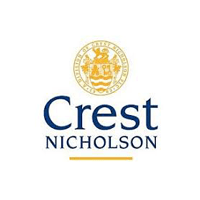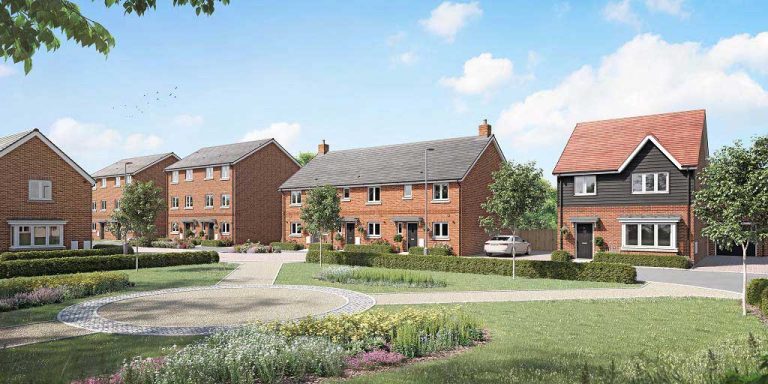Crest Nicholson Holdings plc (LON: CRST), a leading residential developer operating in the Southern half of England, today announced its half-year results for the six months ended 30 April 2019.
Highlights
Half Year Results for the six months ended 30 April 2019
| HY 2019 | HY 2018 | Change | ||
| (Restated*) | ||||
| £m | £m | £m | ||
| Revenue | 501.9 | 467.6 | 34.3 | 7% |
| Cost of sales | (401.6) | (358.6) | (43.0) | |
| Gross profit | 100.3 | 109.0 | (8.7) | |
| Administrative expenses | (29.5) | (30.4) | 0.9 | |
| Operating profit | 70.8 | 78.6 | (7.8) | -10% |
| Operating profit margin % | 14.1% | 16.8% | ||
| Profit before tax | 64.4 | 72.0 | (7.6) | -11% |
| Profit after tax | 51.9 | 58.7 | (6.8) | -12% |
| Earnings per ordinary share (pence) | ||||
| – Basic | 20.2p | 22.9p | (2.7)p | -12% |
| – Diluted | 20.2p | 22.6p | (2.4)p | -11% |
| Dividend per share (pence) | 11.2p | 11.2p | – | – |
* Results for the six months ended 30 April 2018 have been restated to reflect the adoption of IFRS 15 with effect from 1 November 2018.
Commenting on today’s statement, Chris Tinker, Interim Chief Executive, said:
“The Group has made good progress on delivering its revised strategy during this period of heightened political uncertainty. Having paused growth and de-risked our open market sales programme through increased pre-sales and partnership working, it is pleasing to report our first half revenues up 7% from this time last year.
Our strategy to reduce forward sales risk through an increased proportion of pre-funded, presold homes has also realised a 15% increase in our total forward sales position. This increased certainty has traded an element of operating margin, which together with generally flat pricing and continuing build cost inflation, has contributed to a reduction in the operating margin.
We enter the second half of the year with encouraging forward sales, a growing outlet base and an increased proportion of homes for sale at more affordable price points. We have also strengthened our operational experience and capacity with a new Chief Operating Officer in post.
Whilst we continue to work our short-term land bank harder, we are pleased that our excellent place-making track record has enabled us to secure four more sites into our strategic and partnership land portfolio, further increasing the medium and long term store of embedded value in our land portfolio.”
Analyst presentation
There will be a presentation to analysts today at 09.00 BST at etc Venues, Bishopsgate Court, 4-12 Norton Folgate, London E1 6DQ hosted by Chris Tinker, Interim Chief Executive and Rod Holdsworth, Interim Group Finance Director.
Interim Chief Executive’s statement
Financial Review
Overall Group revenue in the first six months of the year increased by 7% to £501.9m (2018: £467.6m), an encouraging result given the uncertain political and Brexit backdrop.
Open-market average selling prices (ASP) including PRS and partnership intermediate housing sales, have increased by 8% to £413k (2018: £384k), largely due to changes in product and location mix. This will represent the top of our ASP progression which is now forecast to reduce as the proportion of higher value homes in higher price locations falls and new outlets with lower ASP sites open.
We have successfully transitioned to a new sales profile where circa 45% of our homes, including affordable housing, are pre-sold and pre-funded leading to an increase in current and forward sales for FY19 to £870.1m (2018: £848.8m).
We have also increased our partnerships working on selected Joint Ventures including the £230m GDV joint venture with the Sovereign Housing Group at Harry Stoke, Bristol. This increased partnership working together with our increased pre-sale strategy, has increased our total forward sales for all years by 15% to £625.2m and helped to lower net debt and deferred land creditors by £41.3m compared with the previous half year.
Operating margins at 14.1% are lower than the 16.8% achieved last half year. This is due to the new strategy to de-risk the business plan through increased forward sales to PRS investors and Registered Providers against a backdrop of continuing build cost inflation at 3-4%.
Operating profits of £70.8m are 10% lower than the £78.6m achieved in the first half of 2018 due to the lower margin partially offset by the higher revenues. Correspondingly, profit before tax of £64.4m is 11% behind the £72.0m achieved in the HY18.
Basic earnings per ordinary share (EPS) for the period at 20.2 pence (2018: 22.9 pence) is 12% lower than the equivalent period in 2018 and is 11% lower than the same period last year on a diluted basis.
Net cash used by operating activities in the first half of the year were £25.6m (2018: £58.2m), reflecting continued investment in our growing divisions in Chiltern and the Midlands, albeit at a lower rate as they mature and we slow down growth.
The Board has resolved to pay an interim dividend of 11.2 pence per share, payable on 4 October 2019 to shareholders on the register on 20 September 2019. The dividend represents approximately one third of the dividend expected to be paid in respect of the financial year ending 31 October 2019.
Financing
At 30 April 2019, the Group had undrawn revolving credit facilities of £95.0m (2018: £170.0m) and cash equivalents of £185.4m (2018: £101.9m).
At 30 April 2019, the business had net debt of £68.3m and an improved net debt/equity ratio of 7.9% (2018: £78.5m and 9.6%). Average net debt during the period was 20% lower at £136.8m (2018: £170.5m). Net debt and land creditors were £260.4m (2018: £301.7m).
In line with our prudent cash strategy, we expect to be net cash positive at the year-end after paying the 2019 dividend.
Sales
Sales rates, as measured by Sales Per Outlet Week (SPOW), reflect the product and location mix, with higher ASP product normally selling at a slower rate. Despite 8% higher ASP’s during the first six months of the year the SPOW has achieved an average 0.78 compared with 0.78 for HY18 and 0.82 for the whole of 2018.
Sales outlets continue to grow steadily, driven by previous investments in Chiltern and the Midlands. In HY19, sales outlets averaged 58, a 12% increase on the 52 average outlets in operation for the HY18. This growth, along with further outlet openings at lower ASP’s in the second half of the year, will help to support the delivery of our forecast full-year revenues.
Forward sales at 31 May 2019 of £625.2m (2018: £544.4m) are 15% ahead of prior year demonstrating our progress in establishing new partnerships and broadening our channels to market.
Land and planning
Given the strength of our land bank and our strategy to pause growth, the Group has continued its disciplined approach to short term land acquisitions, in what is still a benign market. Site acquisitions have largely focused on our growing divisions in the Midlands and Chiltern areas. Overall, the short-term land bank now includes 18,060 units with an assessed GDV of £5.9bn, a level which underpins our divisional delivery plans and serves our multi-tenure route to market.
In line with our ongoing strategy to promote our place-making skills to landowners and partners, and to embed value into our medium and longer term portfolios, our Strategic and Partnership land
pipeline has increased by 15.9% to 19,515 units with an assessed GDV of £6.5bn, through the addition of 2,752 plots across 4 sites.
Outlook
Trading performance has been encouraging in the first half set against the uncertain and politically turbulent backdrop. Business operations are proving resilient and operational efficiency initiatives are making planned progress. We have also recently strengthened the operational leadership team to further support these programmes. We have implemented large parts of the revised strategy and are on track to continue during the second half year.
Given the current market, the Board remains confident in the prospects for the rest of the year and in achieving earnings in line with consensus.
Principal risks and uncertainties
The Group is subject to a number of risks and uncertainties as part of its day to day operations. The Board set out the principal risks and uncertainties facing the Group in detail on pages 64 to 67 of the 2018 Annual Integrated Report, which is available from www.crestnicholson.com. The Board regularly considers these and seeks to ensure that appropriate processes are in place to manage, monitor and mitigate these risks. During the first half of the year the Board has categorised the Group’s efficiency to manage build costs as now a principal risk with build cost inflation continuing to negatively impact operating margin. The Board is also of the view that risks related to solvency and liquidity and the impact of law, policies and regulations are increasing as the macro-economic and political uncertainty continues and the government’s approach to fire safety and related risks becomes clearer.
In summary, our principal risks are:
· The macro-economic environment: The ongoing challenging macro-economic environment including risks from: uncertainty following UK vote to leave EU, general economic slowdown, reduced prominence for elements of Financial Services, wider global growth issues;
· Health, safety and the environment: A significant health and safety event resulting in a fatality, serious injury or a dangerous situation. Significant environmental damage could be caused by operations on site or in our offices (for example, water contamination from pollution);
· Access to site labour and materials: Rising production levels across the industry put pressure on our materials supply chain, while the impact of potential changes to EU labour in the UK remains high. Increased use of more modern methods of construction could result in a labour market unable to meet the skills and knowledge required and a material supply chain lacking the scope and capacity;
· Demand for housing: Heavily influenced by macro-economic factors as outlined in the first risk. Changes to regulations and taxes, for example, stamp duty on Buy to Let purchases and the impact of government schemes like Help to Buy;
· Customer service, quality and product safety: Customer service and/or build quality falls below our required standards. Unforeseen product safety or quality issues, or latent defects emerge as a result of new construction methods;
· Build cost management: Build cost inflation and unforeseen cost increases driven by demands in the supply chain and failure to implement core cost control systems. Lack of awareness and understanding of external factors that may impact build costs including complex planning permissions;
· Information security and business continuity: Cyber Security risks, such as data breaches and hacking leading to the loss of operational systems, market-sensitive, competitive information or other critical data. Risk of non-compliance with new GDPR requirements. Component failure of our IT systems;
· Attracting and retaining employees: Increasing skills gap in the industry at all levels. Difficulty to recruit the right people for vacant positions. Staff turnover, inducting and embedding new staff (including new Board members) and the cost of wages increase as a result of inflated offers in the market. Longer-term succession affected;
· Solvency and Liquidity: Cash generation for the Group is central to our new business strategy, and our cash headroom could be affected by: Economic pressures that result in delayed receipts in the near term and potentially lower sales rate in the medium term. Commitments to significant land and build obligations that are made ahead of revenue certainty;
· Laws, policies and regulations: Future potential regulatory changes due to Brexit and fire safety increase uncertainty within the business and impact our ability to make medium- and longer-term decisions. Potential for inappropriate business practices, fraudulent activity relating to existing laws, for example modern slavery. New National Planning Policy Framework continues to embed with lack of clarity in an environment where local authorities and public sector resources are constrained;
· Supply of permissions and viable land: An inadequate supply of suitable land. Inability to convert conditional land purchases and strategic land into timely viable planning permissions. Slower conversions of planning permissions due to Local Planning Authority capacity.
Statement of Director’s responsibilities
The Directors’ confirm that these condensed consolidated half year financial statements have been prepared in accordance with International Accounting Standard 34, ‘Interim Financial Reporting’, as adopted by the European Union and that the interim management report includes a fair review of the information required by DTR 4.2.7 and DTR 4.2.8, namely:
· an indication of important events that have occurred during the first six months and their impact on the condensed set of financial statements, and a description of the principal risks and uncertainties for the remaining six months of the financial year; and
· material related-party transactions in the first six months and any material changes in the related-party transactions described in the last annual report.
The Directors of Crest Nicholson Holdings plc are listed in the Annual Integrated Report for the year ended 31 October 2018, with the exception of the following changes in the period: Patrick Bergin left the Board on the 26 March 2019, Chris Tinker became Interim Chief Executive on 26 March 2019 and Stephen Stone moved to Non-executive Chairman on the 1 April 2019. A list of current directors is maintained on the Crest Nicholson website: www.crestnicholson.com.
By order of the Board
Chris Tinker
Interim Chief Executive Officer
11 June 2019







































